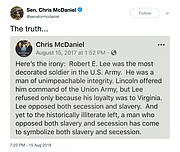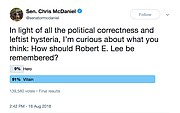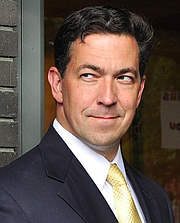State Sen. Chris McDaniel’s embrace of Confederate revisionism appeals to his far-right voting base, such as many who turned out to support him at the Neshoba County Fair and catcall his GOP opponent. Photo by Ashton Pittman.
JACKSON — Mississippi State Sen. Chris McDaniel, R-Ellisville, spent the early months of his 2014 Republican primary bid for U.S. Senate downplaying his ties to neo-Confederate groups.
Yes, he admitted, he delivered a keynote address to the Jones County Roslin Heels—a branch of the Sons of Confederate Veterans—in June 2013.
No, he said, he did not attend a Confederate conference the same group hosted two months later in which one speaker called President Abraham Lincoln a "Marxist."
"Senator McDaniel has driven across Mississippi to speak to many groups over the past decade," his campaign spokesman, Keith Plunkett, said at the time, minimizing the significance of McDaniel's interactions with the group known for seeking to recast the South's role in the Civil War as noble.
Now, in his 2018 bid for the seat he failed to capture four years ago, McDaniel has been less timid about aligning himself with Civil War revisionists. On Aug. 15, he started a Twitter firestorm when he sent out a screenshot of one of his own tweets from last year.
"Here's the irony: Robert E. Lee was the most decorated soldier in the U.S. Army," McDaniel's screenshot read. "He was a man of unimpeachable integrity. Lincoln offered him command of the Union Army, but Lee refused only because his loyalty was to Virginia. Lee opposed both secession and slavery. And yet to the historically illiterate left, a man who opposed both slavery and secession had come to symbolize both slavery and secession."
Historians across the country pounced on McDaniel's screenshot (which turned out to be the unattributed words of conservative commentator and admitted felon Dinesh D'Souza).
"I think it shows that if anyone is historically illiterate, it's Senator McDaniel," Kevin Kruse, a historian at Princeton University, told the JFP.
"The idea that Robert E. Lee was somehow opposed to slavery is belied by his entire history," Kruse said. "He was a slave owner. He inherited slaves—that's true—but what he did to those slaves was much more cruel and brutal than their previous owners had been."
Kruse cited historian Elizabeth Brown Pryor, whose account of Lee's life stands in contrast to the heroic portrait McDaniel and others paint.
"Under Lee's watch, every family except for one was broken up, which was an unusual form of cruelty," Kruse said. "He tore mothers from their children, wives from their husbands, and on and on. He was not a kind master."
Kruse pointed to the 1866 account of Wesley Norris—a former slave of Lee's—who said that after an attempted escape, Lee ordered that he and another slave be whipped across their naked flesh and then washed with brine. "Literal salt in the wound," Kruse said.
"This was not a kindly slave master," Kruse continued. "That's a myth in general, but Lee was definitely not that."
As for Lee's role in the Civil War?
McDaniel on Morning Joe: Black Mississippians 'Begging' for Scraps
On NBC's Morning Joe, Sen. Chris McDaniel drew boos for saying black Mississippians beg for government help.
"He did support secession—he led an armed revolt against the United States," Kruse said. "He broke the oath he took as a soldier of the U.S. Army and waged open war against the United States, and in that war, he was notably cruel to any African Americans he encountered."
Kruse pointed to the Battle of the Crater in 1864, in which soldiers under Lee's command massacred black Union soldiers as they tried to surrender. Later, as president of Washington Lee College, Lee turned a blind eye as students were accused of abducting and raping black girls and of attempted lynchings.
"He refused to see African Americans, both slave and free, as people," Kruse said. "So all in all, Senator McDaniel's view—or I guess Dinesh D'Souza's since he stole the quote from him—is fundamentally wrong."
Responding to McDaniel via tweet, historian Kevin Gannon called McDaniel's rendering of Lee a "racist, whitewashed version of history where the Confederates were 'heroes.'"
"To deny Lee was a supporter of slavery and secession is to deny that the Civil War occurred because a substantial white regional minority refused to abide by the results of a legal election because they saw it as threatening their 'right' to own other people," Gannon wrote. McDaniel's assessment of Lee "flies in the face of all available historical evidence," he added.
McDaniel dismissed the critiques as "leftist hysteria," tweeting a poll asking fans to decide whether Lee was a "hero" or a "villain." After 139,580 votes, 91 percent of respondents had sorted Lee into the "villain" camp, 9 percent "hero."
Read related history at jfp.ms/slavery.
More like this story
More stories by this author
- Governor Attempts to Ban Mississippi Abortions, Citing Need to Preserve PPE
- Rep. Palazzo: Rural Hospitals ‘On Brink’ of ‘Collapse,’ Need Relief Amid Pandemic
- Two Mississippi Congressmen Skip Vote on COVID-19 Emergency Response Bill
- 'Do Not Go to Church': Three Forrest County Coronavirus Cases Bring Warnings
- 'An Abortion Desert': Mississippi Women May Feel Effect of Louisiana Case





